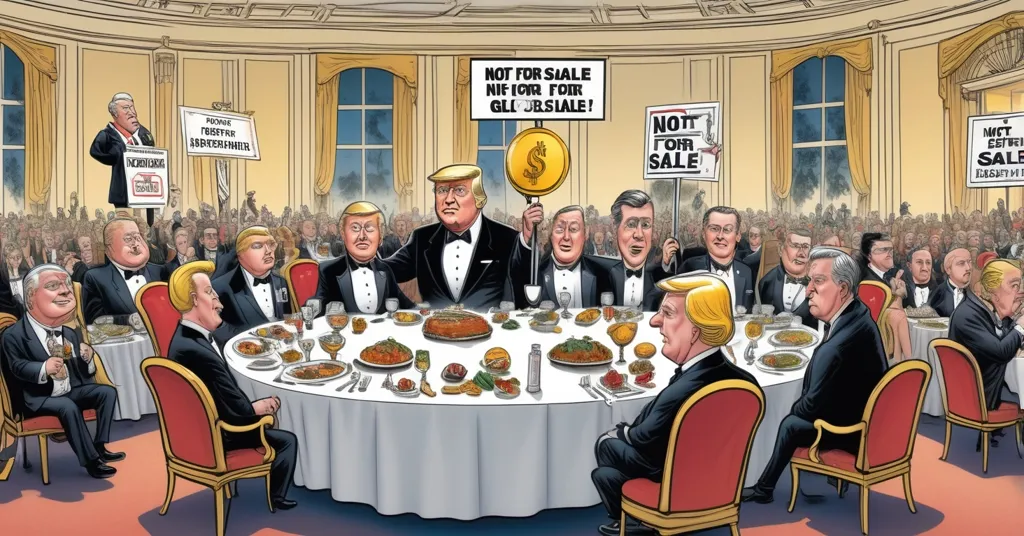Trump’s Memecoin Dinner Triggers Political Backlash and Legislative Pushback

Trump’s Memecoin Dinner Sparks Political Backlash Over Crypto Ties
President Donald Trump’s recent decision to host a dinner with top memecoin investors at his Trump National Golf Club has ignited a political firecracker, drawing sharp criticism from figures like Representative Maxine Waters. Memecoins, often created as a joke or for promotional purposes, have become a point of contention in this controversial event.
- Trump hosts memecoin investors at golf club
- Maxine Waters leads political backlash
- Legislation proposed to ban officials from crypto profits
- Stablecoin bill progress delayed
- Ethical concerns about crypto in politics raised
The dinner, billed as a significant gathering for over 200 crypto enthusiasts who collectively spent $148 million on Trump’s meme coin, was intended to bring together key players in the crypto space. However, Trump’s brief 23-minute appearance left many attendees, including Nicholas Pinto, feeling shortchanged. “We expected more from the president, but he was only there for 23 minutes,” Pinto remarked, capturing the sentiment of many who felt the event was more about personal enrichment than advancing blockchain technology.
Leading the charge against Trump’s dinner is Representative Maxine Waters, who is set to hold a press event on Capitol Hill at 12:45 p.m. Thursday. Waters, alongside Senators Elizabeth Warren, Chris Murphy, and Jeff Merkley, plans to introduce the “Stop TRUMP in Crypto Act of 2025” (H.R. 3573). This legislation aims to prevent U.S. officials and their families from profiting from crypto investments during their terms, a direct response to concerns about corruption and influence peddling. The “Stop TRUMP in Crypto Act” seeks to curb potential conflicts of interest, while the “MEME Act,” previously proposed by Chris Murphy, aims to block federal officials from profiting off digital assets.
The backlash isn’t confined to Congress. The progressive group “Our Revolution” plans to rally outside Trump’s golf club, brandishing the slogan “America Is Not For Sale.” Their protest underscores the broader public discontent with the intertwining of politics and cryptocurrency. This incident highlights the tension between decentralized technologies and centralized political power, a core theme in the ongoing narrative of cryptocurrency’s role in society.
Trump’s team has defended the dinner, arguing that it was a legitimate way to engage with the crypto community and promote innovation. Some attendees also see it as a unique opportunity to discuss blockchain’s future with a sitting president. However, critics blasted Trump’s dinner as a shameless cash grab, raising concerns about the potential for anonymous memecoin buyers to gain political access. This controversy has temporarily slowed progress on other critical crypto legislation, notably the U.S. stablecoin bill (GENIUS Act). Despite clearing a Senate hurdle this week, the bill faces additional complications from a controversial rider added by Senator Josh Hawley, further delaying its advancement.
Trump’s foray into the crypto world extends beyond this dinner. He and his family have launched several ventures, including the $TRUMP and $MELANIA memecoins, and a Trump-backed stablecoin, USD1, through World Liberty Financial. These initiatives have raised eyebrows over potential conflicts of interest and national security risks, particularly given significant foreign investments in these assets. A considerable portion of the top 25 wallets and over half of the top 220 wallets used foreign exchanges, amplifying concerns about foreign influence in U.S. politics through crypto investments.
The $TRUMP memecoin itself saw a 16% price drop following the dinner, reflecting the volatile nature of these digital assets. The involvement of companies like Freight Technologies, which invested in the memecoin to influence U.S.-Mexico trade policy, underscores the broader implications of Trump’s crypto ventures on corporate lobbying and policy-making. While some may see this as a step toward effective accelerationism, accelerating crypto adoption by bringing it into the political spotlight, others worry about the potential for abuse and corruption.
Despite the political backlash, this event highlights the growing influence of cryptocurrencies in shaping our political landscape. The U.S. is racing to keep up with global developments in digital payments, with major U.S. banks considering issuing a unified digital dollar. This urgency underscores the importance of stablecoin legislation like the GENIUS Act. White House AI and crypto czar David Sacks remains optimistic about the bill, suggesting it could unlock trillions in demand for U.S. Treasurys. However, he has yet to address the concerns about conflicts of interest involving the President and his family.
This incident underscores the urgent need for clear ethical guidelines regarding cryptocurrency in U.S. politics. As the crypto landscape evolves, the intersection of digital assets and political influence remains a contentious issue, demanding vigilant oversight and robust legislative action. The controversy also raises questions about how such events might affect Bitcoin differently from other cryptocurrencies, given Bitcoin’s established role in the market.
Key Takeaways and Questions
- What was the purpose of Trump’s dinner with memecoin investors?
The purpose was to bring over 200 crypto supporters together, though critics argue it was more about personal gain than blockchain innovation.
- Who is leading the opposition to Trump’s dinner?
Representative Maxine Waters is leading the opposition, with support from Senators Elizabeth Warren, Chris Murphy, and Jeff Merkley.
- What legislative actions are being proposed in response to Trump’s dinner?
Maxine Waters plans to introduce a bill banning U.S. officials and their families from profiting from crypto investments during their terms. Chris Murphy previously proposed the MEME Act to block federal officials from profiting off digital assets.
- How has the controversy affected other crypto legislation?
The backlash has momentarily slowed progress on key crypto legislation, such as the U.S. stablecoin bill, though it cleared a procedural Senate hurdle this week.
- What broader implications does this event have for crypto ethics in U.S. politics?
The controversy underscores the urgent need for clear crypto ethics rules in U.S. politics, highlighting issues of transparency and the potential for corruption.



